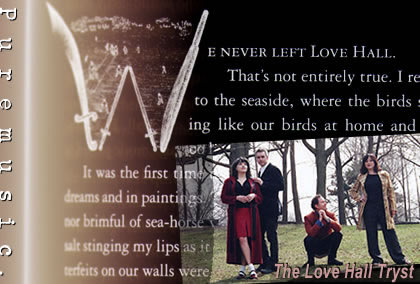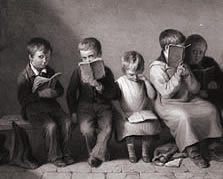
A Conversation with Wesley Stace (continued)
PM: Let's just talk for a moment about Songs of Misfortune by the Love Hall Tryst. The CD came after writing the book, yes?
WS: Yes, it came after the book. Pharoah was a character in the book, Pharoah wrote songs. I am a songwriter. I am the novelist, but I happen to be a songwriter. So when these tunes came, they came with melodies attached. And a kind of album I've always wanted to make, because of my love of the English folk tradition, is an a cappella record. Obviously, I just don't usually write songs that are appropriate to that presentation. I suddenly thought, "Wow, let's do it now."
And going from there to Kelly Hogan, my first stop, and her thinking of Nora O'Conner, her first stop, and then me getting my friend Brian [Lohmann] to do the bass--I've been wanting to do a project with Brian for ages--that was it. And luckily, I'm hooked up for my folk records with a record label that just thought it was a grand idea.
PM: Right. So you're saying that mostly these songs on the Love Hall Tryst album, you wrote them concurrently with writing the book? Did you write them as they came up in the text?
WS: Yeah, and I noted in the liner notes where they appear in the book. The ones I actually wrote the lyrics for are "Do Not Fear the Dark," which is sung at the end by Pharaoh in the tent; and "The Abandoned Baby," which is written by Pharoah in the beginning, and found later, when Rose is in Turkey; and "The Sanguinary Butcher," which isn't in the book at all, but I just happened to write it when I was in a folkie frame of mind. It's based on a true event that happened in England. The rest of them are old traditional folksongs. Now, some of them have tunes that are sort of new, some have tunes that are old, in some I changed the words around. It's the folk process: do whatever the fuck you want with these things.
[laughter]
WS: And that's what's great about them. And I really just put together the ones that I thought would make a great album--a grim album, in many ways, but to me, these songs have stuck around. People ask me such funny questions, or say things like, "I just wanted to slit my wrists after listening to this album because there's so much death in it." And do you, when you listen to any piece of gangster rap music? What's the difference? There's no difference at all. Do you, every time you go to a movie or see any television or the cinema? Did you when you saw TheTexas ChainsawMassacre?
PM: Well, with those examples, like rap or movies, though, there's quite a lot of padding to take the sting out of the messages, whereas with the Songs of Misfortune, because it's an a cappella album, it seems to me that what it rests on are basically the voices and the stories.
WS: Well, I would say that the padding is the music. Because those tunes don't necessarily sound as if what they're about is people being killed.
PM: Fair enough, right.
WS: In fact, many of those songs are sung as lullabies--incredible though it seems to us. They were sung to me in that way, which is why I end up singing them now.
PM: And apart from songs that you wrote completely or wrote words to, or arranged, you also include in the book and on the CD, a Leonard Cohen song.
WS: Well, it's not in the book.
PM: Oh, doesn't Rose mention "La Pucelle" in the text?
WS: Yes, she does. But I got Leonard Cohen's permission to change the title of his song, "Joan of Arc" to "Joan of Arc, the Ballad of La Pucelle," so that is, in fact, a complete piece of sleight of hand. When I was putting the album together, I wanted there to be a lullaby that was "The Ballad of Joan of Arc," because of that bit in the book. I looked for ballads of Joan of Arc, fully well knowing the Leonard Cohen song, which is, without any exaggeration, one of my very favorite songs in the history of songs.
PM: Really?
WS: I love "Joan of Arc." I've loved it for years. I once saw him do it at the Albert Hall, and it was just spellbinding, and there were little flames flickering with the lights. It was brilliant. And so when I was doing this album, I was looking for the ballads of Joan of Arc on the various sites that I look for folk music on, and in various books, and I just couldn't really find one. I found a couple, and they weren't good. Finally I just thought, "I'm just fighting against the obvious here, which would be doing this fantastic song that I've always wanted to do. Then I thought it would be weird if it's called "Joan of Arc" but in the text it says something else. So I wrote to Leonard Cohen, and I said, "Look, here's the entire situation." And he wrote back and said, "Groovy."
PM: Wow!
WS: So that was that. It was Cohen-ly ordained.
PM: Very few people can say that about their work.
WS: I know. It's wonderful. I just think it's very cool that he said yes.
PM: One more question about the CD: You use very specific and sometimes unusual voicings for many of the songs, interesting harmonies that I don't hear very often in folk music. Tell me about that.
WS: I can't really say that we either tried to do that or didn't do that. What I can say is that I picked the tunes for everything, either by drawing from different sources or from just one song or whatever it was, and then we sang those tunes pretty much as I presented them, and fit four voices around it. And that's how it happened. My original plan was to do what the Watersons do, which is everybody sing in unison until somebody can't get a note--
PM: [laughs]
WS: --and then change. And so that was our original plan. We didn't quite do that, but we did on some of the songs. We were trying to give an impression of what we love about that kind of music, of which the main performers would be The Watersons, The Young Tradition, and The Copper Family, who are my three favorite of those kind of singers. We wanted to sound like we'd sung together for 30 years, which is what all those people had going for them. We really just tried to find a way to be very comfortable, and this is what we came up with. I mean, it's really not an album I could say that is contrived in any way, except for the odd business of the fact we chose to do it mostly a cappella.
PM: So we've heard a little bit about what is next. You have another novel that is almost done?
WS: Yeah, it'll be done by I should think February or March--I don't know whether it'll be entirely finished by then, but it'll be at least handed in, if you know what I mean. I'll probably still keep working on it until the very last minute.
PM: And a couple of concepts, anyway, for your next album projects?
WS: Yeah, nothing worth going into, because they'd all probably sound a bit scary, because I come at stuff from a very odd position, oftentimes. But there's definitely something that the progressive side of my music wants to get to do. I have the band and the people and the inclination, and I know what I want to do. It's just a question of writing it. And also there's always a great album to be made with various other bands who are friends of mine who want to work and like to do stuff. And I'm open to all those things at the moment.
We have a baby due in April, fingers crossed. I have a lot of traveling to do. I'm going to Paris, because we just got the French copies of the book today, which look beautiful. And so there's a lot of stuff, always, and it's just a question of not spreading yourself too thin. This novel is the most important thing to me right now, because I really feel like I've got to come to grips with it. After that I think I shall take some time off from writing, while just casually reading books that will act as research for my third novel.
PM: My goodness, projects into perpetuity.
WS: Well, you can't help it, because you read for interest in and pleasure, and you can't stop your mind working, so it just keeps going in a forward direction. But the great thing is, that's why Misfortune, and I hope this next novel, seem very well thought out, because I spent a lot of time thinking about them before I actually wrote them, or while I was writing them. You just end up walking the dog, and try to figure it out. As indeed, I used to walk the dog and think about what the next rhyme would be. So there's always a lot on.
PM: Well, Wes, I want to thank you so much. You have given readers lots to think about, and a lot for us to look forward to in your future.
WS: Great. Thank you.
![]()
[To find out more about the book and the CD, see our review of both of them here. And when you drop by wesleystace.com, do visit the audio section there to hear the author giving a reading. Misfortune is wonderfully illustrated by Abbey Tyson--check out saltboxstudio.com]
 |
print (pdf) |
| listen to clips | |
| buy Misfortune here | |
| wesleystace.com | |
| johnwesleyharding.com | |
| puremusic home |